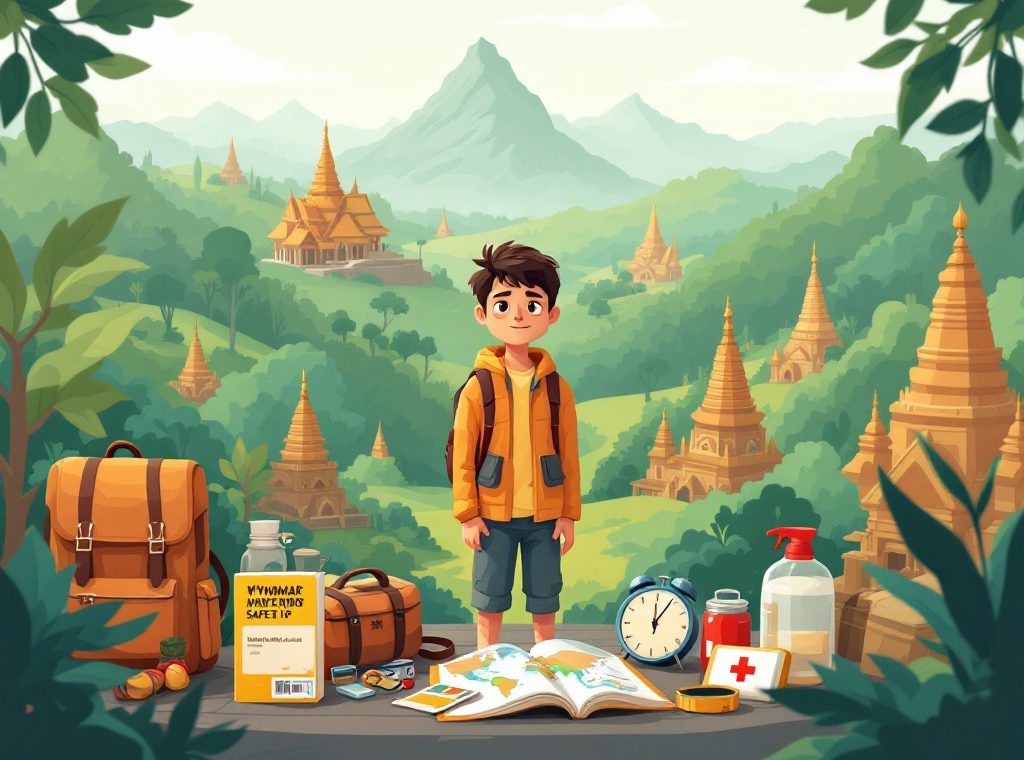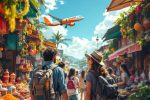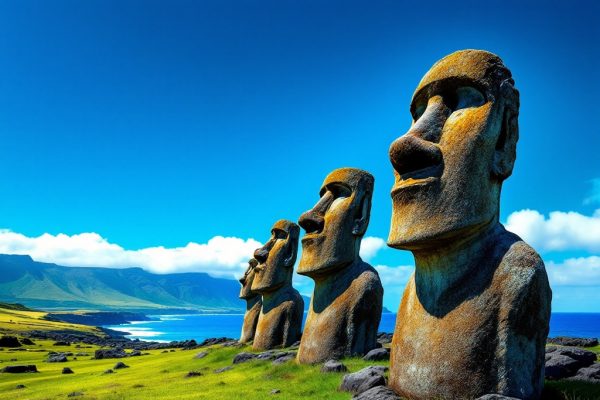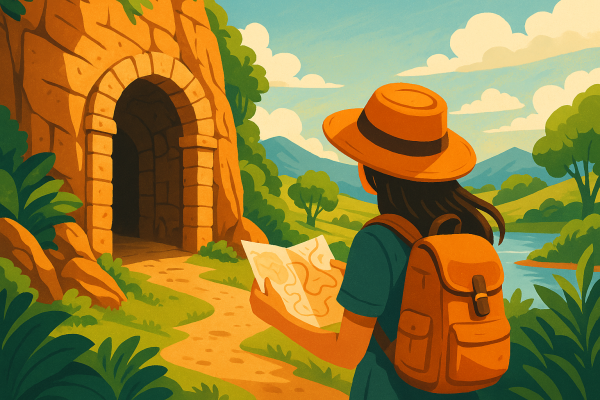How to Travel to Myanmar Safely in 2025: Dos & Don’ts
Planning a trip to Myanmar? Civil unrest, armed conflict, and arbitrary law enforcement pose significant risks, making travel currently unsafe. This comprehensive guide details essential safety precautions, including navigating the complex political climate, understanding visa requirements, and accessing healthcare. Learn crucial tips for staying safe, from avoiding common tourist dangers to securing emergency consular assistance. Prioritize your safety by reading this vital information before considering travel to Myanmar.
Important information
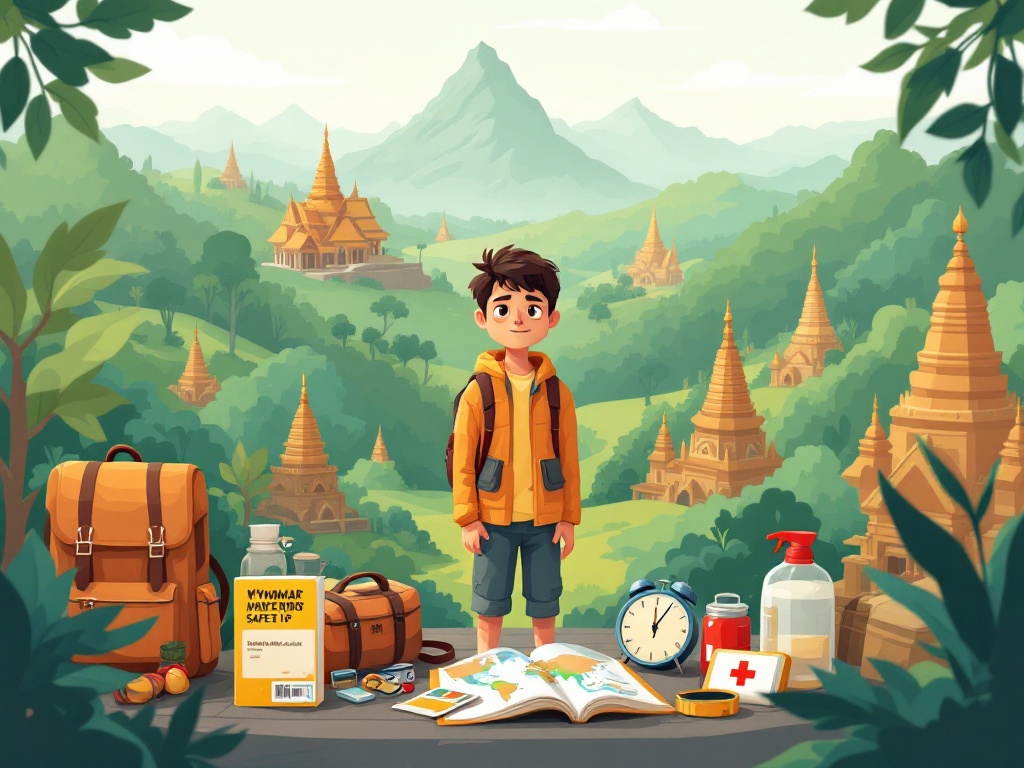
- Myanmar is currently unsafe for travel due to significant civil unrest, armed conflict, and arbitrary enforcement of laws. Violence can occur unexpectedly, posing risks to visitors.
- Travelers should exercise extreme caution, stay informed about local conditions through reliable news and official advisories, and avoid protest areas. Some regions are particularly dangerous due to armed conflict.
- Medical facilities in Myanmar are limited. Obtain necessary vaccinations for Hepatitis A & B, typhoid, MMR, and consider Japanese encephalitis and rabies. Travel insurance with medical evacuation is strongly recommended.
- If you must travel, hire a local guide, respect local customs, avoid political discussions, and minimize nighttime travel. Carry emergency contact information and have a disaster preparedness plan.
- Drink bottled or purified water, be cautious with food hygiene, and use insect repellent. Be aware of stray animals, snakes, and the potential for unexploded ordnance in unmarked areas.
Understanding Travel Risks in Myanmar
Myanmar is currently unsafe for travel. The country faces significant civil unrest and armed conflict, posing serious dangers to visitors. Violence can erupt unexpectedly, so reconsider any travel plans. If you must go, exercise extreme caution and vigilance.
Civil Unrest and Armed Conflict
Myanmar is experiencing significant civil unrest and armed conflict. Ongoing protests against the military regime are frequently met with violence. Extreme caution is advised for anyone traveling in the country. Avoid all protest areas. Be aware that some regions, such as Kachin, Chin, and Rakhine states, are particularly dangerous due to armed conflict and the threat of IEDs and landmines. While these dangers are concentrated in specific areas, the unstable security situation affects the entire country, even typically safe tourist destinations. Staying informed about local conditions is crucial for safe travel.
Arbitrary Enforcement of Laws
Myanmar’s military regime fuels civil unrest through arbitrary law enforcement, often detaining people without due process. This injustice sparks outrage and resistance. The arbitrary detention of individuals without due process is a major cause of the ongoing civil unrest. The people of Myanmar are subjected to unfair and unpredictable enforcement of laws, leading to widespread discontent and resistance against the military regime.
Environmental Dangers for Tourists
When traveling in Myanmar, be aware of stray dogs and snakes, as they can be dangerous. Avoiding tall grass will lessen the risk of snakebites. Have a safe trip.
Impact of Myanmar’s Political Climate on Safety
Safety in Myanmar is closely tied to its political climate, which can change rapidly. The declaration of a state of emergency, a frequent occurrence after major events like earthquakes, adds another layer of complexity. Staying informed is critical. Monitor reliable news sources and official travel advisories for real-time updates. Local guides can be invaluable, assisting with checkpoints and offering local perspectives. Respecting local customs and steering clear of politically sensitive topics is essential. For added safety, minimize nighttime travel. Keep emergency contact details readily available and have a solid disaster preparedness plan. Above all, stay alert and be ready to adapt to changing circumstances. Staying informed, respecting local customs, and having a plan are your best defenses in Myanmar’s dynamic environment.
Essential Safety Tips for Myanmar
- Monitor trustworthy news and official travel advisories for current information.
- Engage local guides for navigation and insights.
- Respect local customs and avoid sensitive political discussions.
- Limit nighttime outings.
- Keep emergency contacts accessible.
- Have a disaster preparedness plan.
Key Considerations
Myanmar’s political landscape is ever-changing, and a declared state of emergency can further complicate matters. Vigilance and adaptability are paramount for safe travels.
Current Security Situation
Safety concerns persist in Myanmar due to ongoing civil unrest and armed conflict, making travel risky. Tourists should exercise extreme caution and consult travel advisories for real-time updates. Staying informed is crucial. Here’s how you can prioritize your safety:
Consult official travel advisories. Check advisories from your government and international organizations for real-time updates and risk assessments.
Monitor news from reputable sources. Stay updated on the evolving security situation through established news outlets.
Consider insights from local communities. While potentially valuable, exercise caution with information from local communities and social media, acknowledging potential biases.
Prioritize your safety above all else. Always put your well-being first and be prepared to adjust your plans as needed.
Crime Against Foreigners
Travelers to Myanmar should be aware of safety concerns, as foreigners can be targets of crime, including attacks. It is crucial to exercise vigilance and take necessary precautions to ensure personal safety throughout your trip.
Visa and Documentation Requirements
Myanmar provides several visa options for travelers:
- e-visas,
- tourist visas,
- business visas.
E-visas and tourist visas typically allow a 28-day stay, while business visas may offer longer validity. Always check official sources or consult a travel agent for the latest visa information, as regulations can change.
Essential travel tips for Myanmar:
- Your passport must be valid for at least six months beyond your intended stay.
- Make copies of your passport, visa, and important documents, storing them separately from the originals.
- Travel insurance is highly recommended to cover unexpected medical costs, trip cancellations, or lost luggage.
Important pre-travel preparations:
- Some areas in Myanmar might require special permits. Research your itinerary and obtain any necessary permits beforehand.
- Travel restrictions can occur due to security issues. Stay updated on travel advisories from official sources.
- Be aware of local customs and traditions during your trip.
Visa and e-Visa Options
Myanmar offers two visa options: traditional visas and e-Visas. The best choice depends on your nationality and the purpose of your visit. Due to the changing political situation, it’s essential to check the latest travel advisories and confirm current visa rules. The Myanmar Ministry of Foreign Affairs website is the best source for the most up-to-date information.
Essential Travel Documents
Passport Validity: ensure your passport is valid for at least six months after your departure date from Myanmar.
Visa: obtain a visa either online through the e-Visa system or from a Myanmar embassy or consulate.
Additional Permits: depending on your itinerary, you may need additional permits, such as trekking permits for certain areas.
Pre-Travel Check: confirm you have all the necessary documents before your trip.
Understanding Permits and Travel Restrictions
Traveling to Myanmar requires awareness of permits and restricted areas. Some regions require specific permissions, so staying informed about governmental travel advisories is crucial for a safe and compliant trip. Check the latest regulations before you depart.
Health and Medical Considerations
Plan your trip to Myanmar ahead of time and get recommended vaccinations, as healthcare access is limited and emergency medical assistance may be difficult to obtain. Be mindful of food safety and protect yourself from insect bites.
Vaccinations and Health Risks
Safeguard your health by getting vaccinated against Hepatitis A and B, typhoid, and measles, mumps, and rubella (MMR). For added protection, especially depending on your itinerary, discuss vaccinations for Japanese encephalitis and rabies with your doctor.
Malaria and dengue fever pose risks in certain areas, so consult your doctor about antimalarials and diligently use mosquito repellent.
Myanmar’s healthcare system is limited, particularly outside major urban centers, where facilities may lack adequate resources and trained personnel. For peace of mind and essential protection, travel insurance that includes medical evacuation is strongly advised.
Access to Healthcare and Emergency Assistance
Navigating healthcare in Myanmar can be tricky for tourists. Many facilities are understaffed and under-resourced, presenting a serious health risk. Therefore, comprehensive travel insurance, including medical evacuation, is absolutely essential for managing emergencies.
Food and Insect Bite Precautions
Stay healthy during your trip to Myanmar by taking precautions with food and insects. Eat only well-cooked meals and drink bottled or purified water. Avoid raw meat, seafood, and eggs. Street food can be tempting, but make sure it’s prepared safely to minimize risks. Protect yourself from mosquito-borne illnesses like dengue fever and malaria. Use insect repellent and wear long sleeves and pants. Sleeping under a mosquito net provides additional protection. Consult your doctor about recommended vaccinations and malaria pills before traveling to ensure a safe and healthy trip.
Safety Precautions for Tourists
Safety and health are essential aspects to consider when traveling in Myanmar. Hiring a local guide can provide valuable insights and ensure smoother passage through checkpoints. Respect local customs and laws, avoiding discussions on sensitive political topics and refraining from photographing military personnel or installations. Be discreet with valuables and avoid displaying expensive items. Traveling in groups, especially in unfamiliar areas, enhances safety. Familiarize yourself with emergency contacts and establish a contingency plan for unforeseen events like natural disasters or civil unrest.
Staying Healthy
- Drink only bottled or purified water, even for brushing your teeth.
- Be cautious of ice, as it may be made from tap water.
- Exercise caution with food hygiene.
- Use insect repellent and mosquito nets to prevent mosquito bites.
- Pack medications for common ailments.
- Ensure you have comprehensive travel insurance, including medical evacuation coverage.
- Avoid traveling after dark whenever possible.
For Solo Female Travelers
- Share your itinerary and regularly update your location with a trusted contact.
- Avoid walking alone at night.
- Dress respectfully, adhering to local customs.
- Choose accommodations with robust security measures.
- Consider learning basic self-defense techniques and carrying a personal safety alarm.
- Trust your instincts and remove yourself from any situation that feels unsafe.
Staying Safe in Major Tourist Areas
While exploring Myanmar’s captivating destinations such as Yangon, Bagan, Mandalay, and Inle Lake, prioritizing safety is crucial. Exercise caution by staying aware of your surroundings and avoiding any protests or suspicious activities. Staying informed about local conditions and respecting local customs and laws will ensure a safe and enriching travel experience.
Avoiding Common Tourist Dangers
Steer clear of stray dogs to avoid potential rabies exposure.
Drink only bottled or purified water to prevent illness.
Practice careful food hygiene to avoid food poisoning.
Use insect repellent for protection against mosquito-borne diseases.
Pay attention to the local infrastructure to avoid accidents.
Never touch unfamiliar metal objects.
Be mindful of dangerous wildlife, such as snakes.
Avoid unmarked roads and paths due to the potential risk of unexploded ordnance.
Water Safety: Tap Water vs. Bottled Water
For safe hydration in Myanmar, tourists should opt for bottled or purified water, as tap water is unsafe to drink. This precaution will help prevent illness.
Advice for Women Traveling Alone
When visiting religious sites, dress respectfully.
Refrain from touching monks.
Engage with locals, but be mindful of their traditions.
Whenever possible, avoid traveling alone after dark.
Maintain situational awareness.
Navigating Transportation in Myanmar
Getting around Myanmar offers travelers various public transport options, including buses, trains, and ferries. However, road safety is crucial due to poorly maintained roads and vehicles. Exercise caution, especially at night, and avoid night travel if possible.
Getting Around Cities
In cities like Yangon and Mandalay, taxis and ride-sharing services (e.g., Grab) are readily available. Negotiate taxi fares beforehand. Motorbike taxis, while common, are riskier, so consider safety.
Long-Distance Travel
For longer journeys, domestic flights provide a faster, though pricier, alternative to buses. When choosing transport in Myanmar, balance safety, reliability, and your budget.
Public Transport and Road Safety
Traveling by bus or train in Myanmar requires extra vigilance due to hazardous road conditions and unsafe driving practices. Exercise caution on any form of public transport for your safety.
Using Taxis and Ride-Sharing Apps like Grab
Taxis are readily available throughout Myanmar, but ride-sharing services like Grab are restricted to specific areas. Always confirm the legitimacy of any service you use for your safety. For example, verify the driver’s identity and share your trip details with someone you trust.
Emergency Contacts and Consular Services
In Myanmar, the key emergency numbers are:
- Police: 199,
- Fire department: 191,
- Ambulance: 192.
Tourists needing police assistance should dial +95 1 250 059.
For consular emergencies, contact your embassy directly:
- US Embassy in Yangon: +95 1 536-500,
- UK Embassy: +95 1 254-073,
- Australian Embassy: +95 1 536 072,
- Canadian Embassy (Bangkok, serving Myanmar): +66 2 696-4600.
Essential Emergency Contacts
For police assistance, dial 199.
In case of fire, contact the fire department at 191.
If you are a tourist and require help, reach the Tourist Police at +95 1 250 071.
For medical emergencies, call 192 for an ambulance.
Your embassy or consulate can also offer immediate support. Contact them as soon as possible.
Emergency Consular Assistance
When traveling abroad, your embassy or consulate is your lifeline in an emergency. They can provide critical assistance with issues like lost passports, arrests, and medical crises. Locate their contact information online before you travel and don’t hesitate to reach out if needed.

